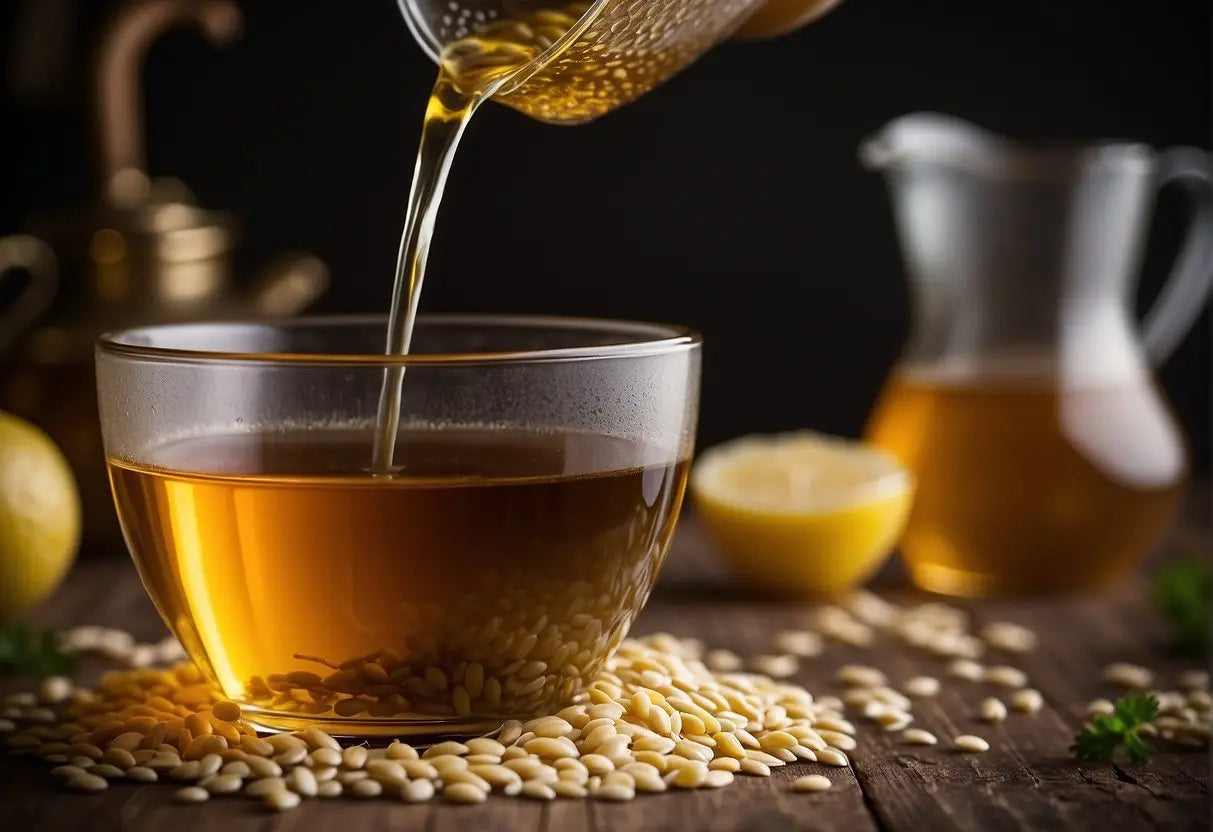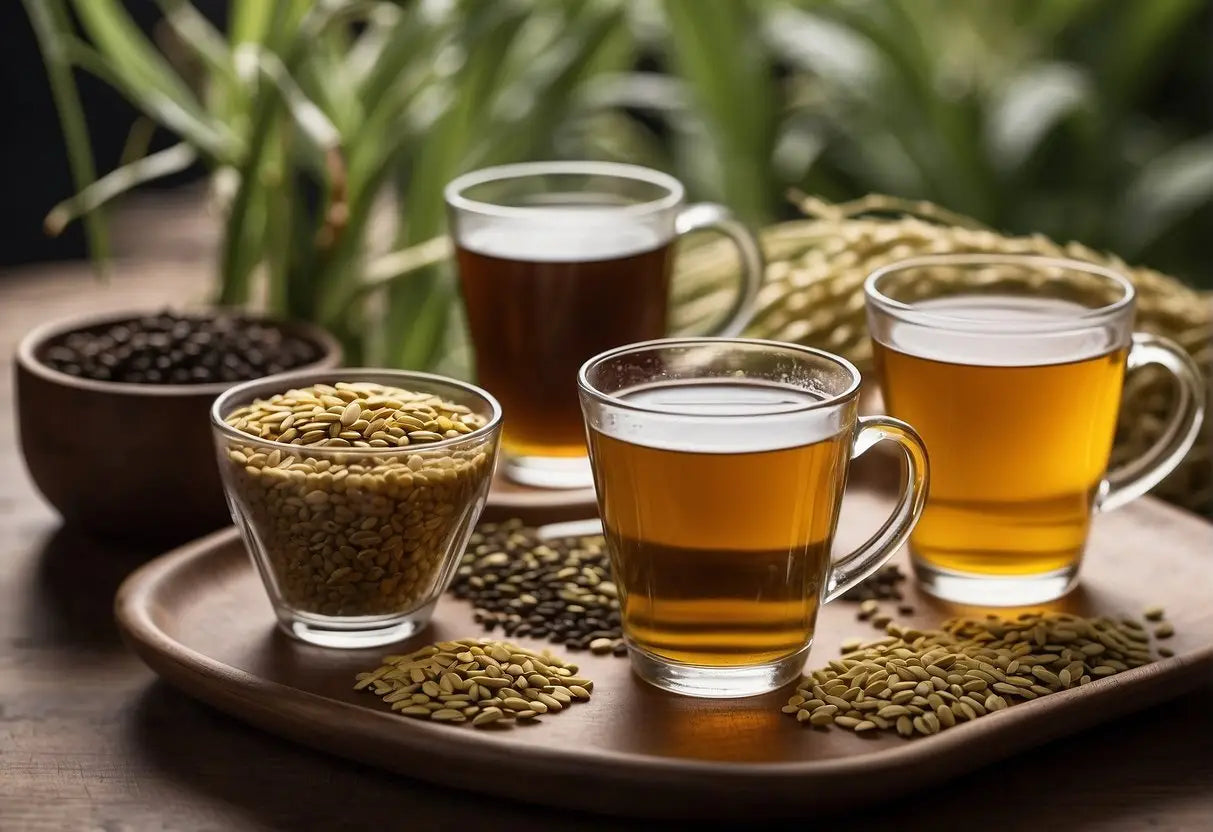Barley Tea Benefits
Barley tea, a beverage made from roasted barley grains, is not only refreshing but also comes with a variety of health benefits tailored to support your wellbeing.
Rich in Antioxidants
Barley tea is a significant source of antioxidants, which are compounds that help protect your cells from damage caused by free radicals. The antioxidants in barley tea, such as vitamin C and selenium, contribute to your overall health by supporting immune function and reducing inflammation.
-
Antioxidants Found in Barley Tea:
- Vitamin C
- Selenium
Supports Digestive Health
Your digestive system can also benefit from barley tea. Its high fiber content aids in the effective management of your digestive processes, which can lead to better nutrient absorption and regular bowel movements.
Bestsellers
-
Digestive Benefits:
- Enhances nutrient absorption
- Promotes regularity
Promotes Cardiovascular Wellness
Barley tea supports cardiovascular health by influencing factors such as blood pressure and cholesterol levels. Regular consumption may be associated with a reduced risk of cardiovascular diseases due to its potential influence on these indicators.
-
Cardiovascular Indicators:
- Blood pressure regulation
- Cholesterol level management
Aids in Weight Management
Including barley tea in your diet may support weight management efforts. Its potential to promote feelings of fullness and its low-calorie content make it an excellent addition to weight loss or maintenance programs.
-
Weight Management Properties:
- Increases feelings of fullness
- Low in calories
Nutritional Profile of Barley Tea
Barley tea, brewed from roasted barley grains, is a beverage rich in antioxidants and several nutrients that contribute to your health. It lacks cholesterol and is low in sodium.
Vitamins and Minerals:
Barley tea provides a modest range of minerals such as magnesium, which plays a vital role in many bodily functions. It also contains trace amounts of potassium, calcium, and phosphorus.
- Magnesium: important for bone health and energy production
- Potassium: helps regulate fluid balance and blood pressure
- Calcium: essential for bone strength
- Phosphorus: important for the formation of bones and teeth
Antioxidants:
Your cup of barley tea includes antioxidants like selenium, which is known for its immune-boosting properties.
- Selenium: helps protect your cells from damage
Dietary Fiber:
While the tea itself is a liquid, it retains some of the dietary fiber from the barley grains, beneficial for your digestion.
Polyphenols and Flavonoids:
You will also find polyphenols and flavonoids in barley tea, which are compounds known to support heart health and may prevent certain diseases.
- Polyphenols: contribute to the prevention of oxidative stress
- Flavonoids: associated with a lower risk of chronic conditions
Caffeine Content:
Barley tea is naturally caffeine-free, making it a suitable choice for those looking to reduce caffeine intake.
| Nutrient | Benefit |
|---|---|
| Magnesium | Energy production, bone health |
| Potassium | Fluid balance, blood pressure regulation |
| Calcium | Bone strength |
| Phosphorus | Bone and tooth formation |
| Selenium | Cellular protection, immune function |
| Dietary Fiber | Digestive health |
| Polyphenols | Oxidative stress prevention |
| Flavonoids | May reduce risk of chronic diseases |
Enjoy barley tea for its unique flavor and the various nutritional benefits it offers without the worry of caffeine.
Preparation and Brewing Tips

To brew a satisfying cup of barley tea, you'll need roasted barley grains, either whole or crushed, and water. Start by measuring your ingredients:
- Barley: 1 to 2 tablespoons (15-30 ml)
- Water: 1 liter
Follow these steps for brewing:
Lao Ban Zhang
- Rinse: Briefly rinse the barley under cold running water to clean it.
-
Boil: Add barley to a pot of water. Bring to a boil and then simmer.
- Whole Grains: Simmer for 20 to 30 minutes.
- Crushed Grains: Simmer for 10 to 15 minutes.
- Steep: Remove from heat. Let it steep for 5 minutes for a more robust flavor.
- Strain: Pour the tea through a fine-mesh strainer into a pitcher or teapot.
- Serve: Enjoy hot, or allow it to cool and serve over ice for a refreshing drink.
For a Cold Brew:
- Place: Put barley in a pitcher of cold water.
- Refrigerate: Allow it to steep in the fridge for about 8 hours, or overnight.
- Strain: Remove barley grains, and your cold brew is ready.
Tip: If you prefer a stronger taste, increase the amount of barley or extend the steeping time. For a milder flavor, do the opposite.
Remember, water quality can affect the taste of your tea. Using filtered or spring water can lead to a cleaner taste. Storage conditions for your tea can also play a role in flavor preservation. Store your barley in a cool, dry place away from direct sunlight.
Potential Therapeutic Uses
Barley tea contains compounds that may provide several health benefits related to chronic disease prevention, sleep enhancement, and detoxification.
May Reduce Risk of Chronic Diseases
Your intake of barley tea could have a preventive effect against certain chronic diseases. Research shows that the antioxidants present in barley tea, such as selenium and vitamin A, are vital in combating oxidative stress, which is a known contributor to chronic conditions.
- Reduction in Heart Disease Risk: Barley tea contains flavonoids which have been linked to a lower risk of heart disease.
- Cancer Prevention Potential: Studies indicate that barley tea contains compounds like selenium which might play a role in reducing the risk of certain cancers.
Could Improve Sleep Quality
Drinking barley tea might be beneficial if you struggle with sleep.
- Melatonin and Tryptophan: Barley tea contains both melatonin, a sleep-regulating hormone, and tryptophan, which is a precursor to melatonin production in your body.
Possibility of Detoxification
Your body's detoxification processes could be supported by regularly consuming barley tea. The tea is known for its diuretic properties, which may help in effectively flushing out toxins from your system.
- Antioxidant Support: The antioxidants in barley tea can aid in neutralizing toxins and supporting liver health.
- Kidney Stone Prevention: Barley tea has been associated with lowering the chances of kidney stone formation due to its potential in increasing urine volume.
Culinary Uses Beyond Drinking

Barley tea, known for its toasty flavor, is not just a refreshing beverage but also a versatile ingredient in the kitchen. You'll find its robust taste can enrich various dishes.
Grains and Soups:
- Rice: Cook your rice with barley tea instead of water to infuse a nutty flavor.
- Soup: Add brewed barley tea to soups for a deeper, richer broth.
Marinades and Sauces:
- Meat Marinade: Use cooled barley tea to marinate meats; it tenderizes and adds a unique taste.
- Salad Dressing: Incorporate it into vinaigrettes for a subtle, earthy undertone.
Desserts:
- Popsicles: Freeze barley tea with bits of fruit for a healthy, icy treat.
- Jellies: Enhance your jellies by substituting water with barley tea during preparation.
Barley Tea Ice Cubes:
- Preserve the tea in ice cube trays and use them to cool down and flavor delicate cocktails or iced teas.
Incorporating barley tea into your cooking elevates your dishes with a distinct, wholesome twist. Experiment and enjoy the unique flavors it brings to your culinary creations.
Comparison with Other Teas
When you explore the world of teas, you'll find that each type offers unique benefits. Barley tea, often consumed in East Asian countries, has distinct characteristics when compared to green tea and black tea.
Barley Tea vs Green Tea
Antioxidant Content: Green tea is renowned for its high concentration of catechins, powerful antioxidants that can protect your cells from damage. Barley tea contains antioxidants as well, though mainly in the form of vitamin E and selenium, which are beneficial for skin health and immune function.
- Caffeine: If you're sensitive to caffeine, you'll appreciate that barley tea is naturally caffeine-free, unlike green tea, which typically has around 20-45 mg of caffeine per cup.
- Flavor Profile: Barley tea has a toasty, nutty flavor, which is milder and less astringent than the grassy and sometimes bitter taste of green tea.
Barley Tea vs Black Tea
Fermentation Process: Black tea is fully fermented, which gives it a robust, deep flavor and a higher caffeine content, usually around 40-70 mg per cup. Barley tea is not made from the tea plant and undergoes a roasting process rather than fermentation, resulting in its unique taste with zero caffeine.
- Tannins: Black tea has higher levels of tannins compared to barley tea, which contribute to its characteristic dark color and can also affect iron absorption. Barley tea has lower levels of tannins, making it a suitable option if you're concerned with tannin consumption.
- Flavor Profile: If you enjoy malty flavors, black tea might suit your palate, while barley tea offers a lighter, more subtle taste that's perfect for those who prefer less intensity in their brew.
Cultural Significance in Different Countries

In Japan, barley tea, known as mugicha, is a staple during the summer months. You’ll find it served cold, offering a refreshing and hydrating beverage. It's so prevalent that you might see it in vending machines and convenience stores.
Moving to Korea, where it's called boricha, barley tea is consumed year-round. It's often the standard offering in homes and restaurants, typically served warm. Here, it's not only a daily beverage but also carries the importance of being the first drink offered to guests, reflecting hospitality.
In China, dàmàichá is enjoyed for its perceived health benefits. Though not as universally consumed as in Japan and Korea, it's nevertheless present and linked with traditional Chinese medicine practices.
Below is a snapshot of barley tea’s cultural significance:
| Country | Name | Typical Serving | Cultural Note |
|---|---|---|---|
| Japan | Mugicha | Cold | Ubiquitous in summer, found in vending machines. |
| Korea | Boricha | Warm | Daily drink, signifies hospitality. |
| China | Dàmàichá | Varied | Associated with traditional medicine. |
Barley tea has also made its way into the diets of people in other countries seeking diverse tea options and intrigued by its potential health benefits. While not as culturally ingrained elsewhere, its uptake in cafes and health food stores indicates a growing appreciation.
← Older post Newer post →











